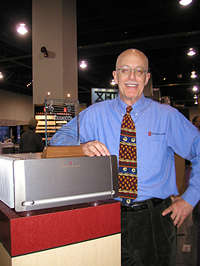| Columns Retired Columns & Blogs |
Industry Roundup
 Parasound wins design award: Only a week after receiving a Stereophile 2003 "Product of the Year" award at the Consumer Electronics Show in Las Vegas for its excellent Halo JC-1 monoblock power amplifier—Richard Schram is shown accepting the award (right)—Parasound Products won a 2003 "Good Design Award" from the Chicago Athenaeum Museum of Architecture and Design. The company's Halo C1 preamp/surround sound processor emerged on top in the museum's annual design competition, "one of the oldest and most important such events in the world," according to a January 16 announcement from Parasound. The C1 and other winners will be on exhibit in the museum from April 3–June 13, 2004. Opening day of the exhibit will be populated with dignitaries, design professionals, and representatives of the press.
Parasound wins design award: Only a week after receiving a Stereophile 2003 "Product of the Year" award at the Consumer Electronics Show in Las Vegas for its excellent Halo JC-1 monoblock power amplifier—Richard Schram is shown accepting the award (right)—Parasound Products won a 2003 "Good Design Award" from the Chicago Athenaeum Museum of Architecture and Design. The company's Halo C1 preamp/surround sound processor emerged on top in the museum's annual design competition, "one of the oldest and most important such events in the world," according to a January 16 announcement from Parasound. The C1 and other winners will be on exhibit in the museum from April 3–June 13, 2004. Opening day of the exhibit will be populated with dignitaries, design professionals, and representatives of the press. Red Rose team splits up: Engineer Victor Tiscareno and marketing executive Byron Collett have announced their departure from Red Rose Music, effective January 1. The founding partners of AudioPrism declined to renew their employment contracts, citing "compelling interests elsewhere"— primarily a new and still unnamed technology company that will bridge traditional two-channel audio, multichannel, home theater, and multimedia. Mark Levinson remains CEO of Red Rose. The departure was an "amicable agreement" by all parties, according to Tiscareno. "We wish Mark continued success with Red Rose," he stated. He and Collett demonstrated prototype loudspeakers at CES, where they made their announcement via a press release that was distributed on the show's first day.
Swan song for Tower? Tower Records is in dire financial straits and may not find investors in time to save it from bankruptcy, according to a January 15 report in The New York Post. The Sacramento, CA–based record chain, one of the world's largest, has been in trouble before. Tower defaulted on its debt in June 2003 and has been looking for a bailout ever since, according to the Post. That may not happen. Investor interest in record stores is currently at an all-time low. In 2003, Wherehouse Entertainment filed for bankruptcy protection, its second such filing in seven years, and has downsized its operation to only its most profitable locations. Electronics chain Best Buy also won goodwill among the investment community and a boost in its stock price by unloading its Musicland division. "Investment bankers have shopped Tower 'to almost everyone,'" the Post quoted an unidentified music industry analyst. The company has 113 stores throughout the world.
Warner Music restructuring: Warner Music Group (WMG) will undergo a "significant restructuring" in the wake of its acquisition by Edgar Bronfman Jr.'s investment group, according to a January 15 report by The Hollywood Reporter. The Bronfman buyout should be completed by the end of February. The WMG restructuring will take place over the ensuing 18 months, and will undoubtedly involve discharging "redundant" workers. The Reporter quotes an email memo from WMG chairman and CEO Roger Ames that mentions a severance program to offer three weeks of salary for every year of service, with an additional week given to those with less than four years of service. "This process will involve a difficult period," Ames wrote, "but it is essential for the overall health of the company."
EMI bouncing back? Facing declining sales, record stores are on the wane and major labels continue to shrink their workforces, but investors have found new enthusiasm for the UK's EMI Group PLC. A January 17 report from Reuters news service notes that both Goldman Sachs and UBS Warburg have upgraded their ratings on EMI, said to be "the world's largest publicly traded stand-alone music company." EMI's stock has risen more than 40% since January 1, driven in part by reports "that discounted CD prices pushed UK album sales up 7.6% in 2003." Some analysts reportedly believe that the increasing popularity of legal downloading and the music industry's continuing pursuit of pirates bode well for the industry in general and for EMI in particular.
- Log in or register to post comments




































